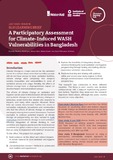| dc.contributor.author | Nuzhat, Samiha | |
| dc.contributor.author | Iyer, Ruhil | |
| dc.contributor.author | Qader, Adnan Ibne Abdul | |
| dc.contributor.author | Manzoor-Al-Islam, Saief | |
| dc.coverage.spatial | Bangladesh | en |
| dc.date.accessioned | 2023-07-28T08:35:47Z | |
| dc.date.available | 2023-07-28T08:35:47Z | |
| dc.date.issued | 2023-07 | |
| dc.identifier.citation | Nuzhat, S.; Iyer, R.; Qader, A.I.A. and Manzoor S.M.A. (2023) ‘A Participatory Assessment for Climate-Induced WASH Vulnerabilities in Bangladesh’, SLH Learning Brief 16, The Sanitation Learning Hub, Brighton: IDS DOI: 10.19088/SLH.2023.013 | en |
| dc.identifier.isbn | 978-1-80470-132-4 | |
| dc.identifier.uri | https://opendocs.ids.ac.uk/opendocs/handle/20.500.12413/18060 | |
| dc.description.abstract | This SLH Learning Brief presents work undertaken by WaterAid Bangladesh and Rupantar in collaboration with the Sanitation Learning Hub (SLH), at the Institute of Development Studies, and the University of Technology Sydney - Institute for Sustainable Futures (UTS-ISF).
A sanitation-focused climate lens was added to existing ward vulnerability assessment tools due to the increasing WASH-related climate impacts in the study site. The aim was to understand climate induced impacts on WASH and feed this into programmatic guidance through the preparation of locally-led comprehensive ward development plans.
This SLH Learning Brief is intended to provide inspiration to practitioners and WASH experts on how to adapt existing vulnerability assessment tools to integrate climate considerations. This study engaged several stakeholders including climate vulnerable populations, development practitioners, researchers, and local government across Krishnanagar Union under Sathkhira subdistrict, to create evidence-based approaches to address climate induced WASH vulnerabilities in coastal Southwest Bangladesh.
This research sought to answer the following questions:
1. What is the current status of WASH facilities in nine wards across in rural southwest Bangladesh?
2. How are climatic conditions impacting water, sanitation and hygiene practices?
3. What actions can be undertaken by various stakeholders to address climate induced WASH problems? | en |
| dc.description.sponsorship | Sida | en |
| dc.language.iso | en | en |
| dc.publisher | The Sanitation Learning Hub, Institute of Development Studies | en |
| dc.relation.ispartofseries | SLH Learning Brief;16 | |
| dc.rights.uri | http://creativecommons.org/licenses/by-nc/4.0/ | en |
| dc.subject | Climate Change | en |
| dc.subject | Participation | en |
| dc.title | A Participatory Assessment for Climate-Induced WASH Vulnerabilities in Bangladesh | en |
| dc.type | Series paper (non-IDS) | en |
| dc.rights.holder | Institute of Development Studies | en |
| dc.identifier.externaluri | https://sanitationlearninghub.org/resource/a-participatory-assessment-for-climate-induced-wash-vulnerabilities-in-bangladesh/ | |
| dc.identifier.doi | 10.19088/SLH.2023.013 | |
| dcterms.dateAccepted | 2023-07 | |
| rioxxterms.funder | Default funder | en |
| rioxxterms.identifier.project | Default project | en |
| rioxxterms.version | VoR | en |
| rioxxterms.versionofrecord | 10.19088/SLH.2023.013 | en |
| rioxxterms.funder.project | 43db2a26-ab53-4dd1-873f-cff26a51d1e0 | en |


